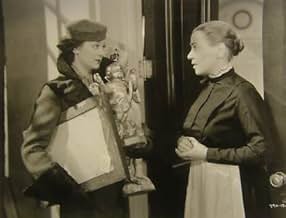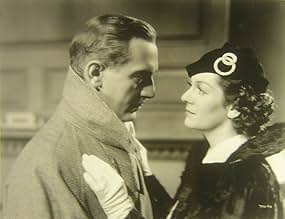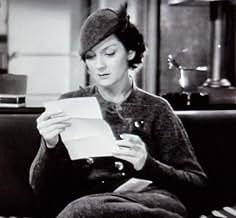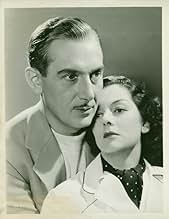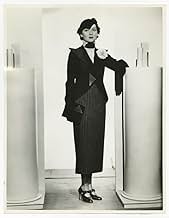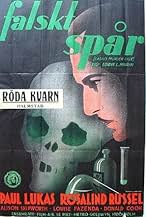Füge eine Handlung in deiner Sprache hinzuAfter socialite Lynn Llewellyn receives an anonymous threat, he is poisoned at his uncle's casino, and although he recovers, his wife is murdered by the same killer.After socialite Lynn Llewellyn receives an anonymous threat, he is poisoned at his uncle's casino, and although he recovers, his wife is murdered by the same killer.After socialite Lynn Llewellyn receives an anonymous threat, he is poisoned at his uncle's casino, and although he recovers, his wife is murdered by the same killer.
Purnell Pratt
- District Attorney John Markham
- (as Purnell B. Pratt)
Leo G. Carroll
- Smith
- (as Leo Carroll)
Ernie Adams
- Husband of Fat Lady at Auction
- (Nicht genannt)
Brooks Benedict
- Casino Patron
- (Nicht genannt)
Edna Bennett
- Nurse to Lynn
- (Nicht genannt)
Sidney Bracey
- Waiter
- (Unbestätigt)
- (Nicht genannt)
Empfohlene Bewertungen
One of many films with Philo Vance as the protagonist but the only one with Paul Lukas as the famed detective. He isn't a perfect fit as Vance but does a good job nonetheless.
The real reason to catch this is to get a glimpse of Rosalind Russell early in her career. At this point she was starting to get mired in, as she referred to them, "Lady Mary" roles all dignity, stiff upper lip and little humor. This part hints at the skillful comedienne she was to become. This was only her fifth film but the first where her name appeared above the title a clear sign that the studio had bigger plans for her than to be a leading lady in B pictures.
As for the mystery it's not terribly hard to figure out but it's stylishly shot with a good supporting cast.
The real reason to catch this is to get a glimpse of Rosalind Russell early in her career. At this point she was starting to get mired in, as she referred to them, "Lady Mary" roles all dignity, stiff upper lip and little humor. This part hints at the skillful comedienne she was to become. This was only her fifth film but the first where her name appeared above the title a clear sign that the studio had bigger plans for her than to be a leading lady in B pictures.
As for the mystery it's not terribly hard to figure out but it's stylishly shot with a good supporting cast.
As good an actor as Paul Lukas is, his accent destroys the illusion that he's the great American detective, Philo Vance, and I was conscious of that throughout. The murder mystery gets off to a good start, but then falters when Vance speculates that perhaps it was "heavy water" that was used as the poison, since it was not known if that substance was poisonous. That idea was pulled out of thin air in an effort to explain why people drinking water would be poisoned. I disliked this development, sensing it was just a plot device to keep the movie rolling, and I was right. He mentions deuterium, Harold Urey's experiments, and the fact a quart of the substance would be worth $100,000, but I'm sure 99% of the 1935 audience didn't know what he was talking about anyway. It would have been much better if he came across Kinkaid's laboratory isolating heavy water by accident and then thought about the possibility of its use as a poison.
But I did enjoy some of the comic relief. William Demarest plays an auctioneer trying to convince people that an ugly statue of cupid was made for Louis XIV, even after his assistant announces it says "made in Japan" on the bottom. In a running gag, Louise Fazenda plays the maid who is caught a dozen times listening at a keyhole and sheepishly says "Did you call, sir," each time. And Charles Sellon is the coroner always complaining about the inconsiderate murder victims getting bumped off just when he's trying to sleep. And there's more comedy too.
But I did enjoy some of the comic relief. William Demarest plays an auctioneer trying to convince people that an ugly statue of cupid was made for Louis XIV, even after his assistant announces it says "made in Japan" on the bottom. In a running gag, Louise Fazenda plays the maid who is caught a dozen times listening at a keyhole and sheepishly says "Did you call, sir," each time. And Charles Sellon is the coroner always complaining about the inconsiderate murder victims getting bumped off just when he's trying to sleep. And there's more comedy too.
Thus spake Paul Lukas during an uncharacteristic serious moment in this very entertaining, almost light-hearted entry in the Philo Vance canon, this one by MGM.
The play's the thing, right? That's what makes or breaks a movie for most of us - was it a good show or not? This was an excellent murder mystery, a mysterious mystery if you will, and it keeps you guessing until almost the final scene and defies you to figure out the identity of the murderer. There were lots of red herrings and the screenwriters take a few liberties with our credulity, but I thought that, on balance, this was one of the better murder mysteries to come out of Hollywood in the 30's, or any other period for that matter.
William Powell spoiled the Philo Vance character for us. He was so breezy and sophisticated that any other actor would pale in comparison. And Paul Lukas is a pale imitation, to be sure, try as he might. He lacks the suave and cocky air that Powell projected, plus he has an off-putting European accent. But MGM surrounded him with some of the best supporting and character actors available, among them Rosalind Russell, Donald Cook, Isabel Jewell, Eric Blore and the incomparable Allison Skipworth. They also threw in a dance scene at the Casino with "Blue Moon" as background music and with everyone in evening dress. It was, of course, dated but elegant nevertheless.
Remove Lukas and substitute anyone else and this is an 8 rating. As is, I give it a 7.
The play's the thing, right? That's what makes or breaks a movie for most of us - was it a good show or not? This was an excellent murder mystery, a mysterious mystery if you will, and it keeps you guessing until almost the final scene and defies you to figure out the identity of the murderer. There were lots of red herrings and the screenwriters take a few liberties with our credulity, but I thought that, on balance, this was one of the better murder mysteries to come out of Hollywood in the 30's, or any other period for that matter.
William Powell spoiled the Philo Vance character for us. He was so breezy and sophisticated that any other actor would pale in comparison. And Paul Lukas is a pale imitation, to be sure, try as he might. He lacks the suave and cocky air that Powell projected, plus he has an off-putting European accent. But MGM surrounded him with some of the best supporting and character actors available, among them Rosalind Russell, Donald Cook, Isabel Jewell, Eric Blore and the incomparable Allison Skipworth. They also threw in a dance scene at the Casino with "Blue Moon" as background music and with everyone in evening dress. It was, of course, dated but elegant nevertheless.
Remove Lukas and substitute anyone else and this is an 8 rating. As is, I give it a 7.
In the wake of the success of The Thin Man, the studios began to churn out scads of little mystery movies that are really more like screwball comedies than problems in deduction or thrillers. This is a pretty good sample of the type, with Rosalind Russell showing a flair for the genre that would be exploited in His Girl Friday. It even takes about 15 minutes or so before anyone gets murdered.
Paul Luckas is fine as the sleuth in the picture. Any resemblance between him and the Philo Vance depicted in the series of novels by S.S. Van Dine is a coincidence. This Philo is charming, polite, and doesn't mind when Roz complains that his mystery stories are wordy and complicated. And shouldn't come as a surprise that this Philo is more seems more interested in Roz than the mystery at hand. The actual crime is mildly intriguing, but the solution is mildly ridiculous.
Treat this as a pleasant way to spend a little more than an hour, and look at cool 30s cars, clothes and decor. Don't look for great art here.
Paul Luckas is fine as the sleuth in the picture. Any resemblance between him and the Philo Vance depicted in the series of novels by S.S. Van Dine is a coincidence. This Philo is charming, polite, and doesn't mind when Roz complains that his mystery stories are wordy and complicated. And shouldn't come as a surprise that this Philo is more seems more interested in Roz than the mystery at hand. The actual crime is mildly intriguing, but the solution is mildly ridiculous.
Treat this as a pleasant way to spend a little more than an hour, and look at cool 30s cars, clothes and decor. Don't look for great art here.
The Philo Vance series of mysteries made in the 20s, 30s, and 40s were of widely varying quality. The first four starred William Powell and were excellent as Powell fit the Philo Vance character like a glove. But then Powell left Warner Brothers for MGM and the Philo Vance franchise (largely) moved there too, but oddly enough MGM never put Powell back into the Philo Vance role. Were they afraid he'd leave there too if he had to play Vance again? At any rate, over the years, Basil Rathbone, Warren William, Edmund Lowe, James Stephenson, and - in this case - Paul Lukas played Philo Vance at Warner Brothers, MGM, and Paramount.
Lukas does a good enough job here, and he gets the urbane and sophisticated style of Vance down well enough, but I'm just not buying the European accent on a cinematic Vance. The plot has Vance receiving an anonymous note saying that if socialite Lynn Llewelyn goes to the casino that night he will be in danger. He does so anyways and is poisoned but survives. His wife is also poisoned - at home - but dies. Vance investigates with the help of Llewelyn household servant Doris Reed (Rosalind Russell).
MGM put star power and production value effort into this, but forgot the plot and pacing, and as a result it is as boring as watching paint dry. I will say, though, that the end does an interesting and unique end run around the production code. Also, this is when MGM was still trying to push Ted Healy, and thus they completely miscast him as police Sergeant Heath, who spends most of his time admiring himself and his tuxedo in a mirror. Why I have no idea. The best actor to play Heath was Eugene Pallette who played it likeable and professional, even if deferential to Vance. Healy couldn't be likeable if you gave him detailed instructions and diagrams.
Apparently Rosalind Russell really hated this film - It was when she was first starting out, had not yet become established, and as a contract player had to do what she was told. I wouldn't say this was the worst role I've ever seen her in, but it just might be the worst film. I'd avoid this one unless you are a Philo Vance completist.
Lukas does a good enough job here, and he gets the urbane and sophisticated style of Vance down well enough, but I'm just not buying the European accent on a cinematic Vance. The plot has Vance receiving an anonymous note saying that if socialite Lynn Llewelyn goes to the casino that night he will be in danger. He does so anyways and is poisoned but survives. His wife is also poisoned - at home - but dies. Vance investigates with the help of Llewelyn household servant Doris Reed (Rosalind Russell).
MGM put star power and production value effort into this, but forgot the plot and pacing, and as a result it is as boring as watching paint dry. I will say, though, that the end does an interesting and unique end run around the production code. Also, this is when MGM was still trying to push Ted Healy, and thus they completely miscast him as police Sergeant Heath, who spends most of his time admiring himself and his tuxedo in a mirror. Why I have no idea. The best actor to play Heath was Eugene Pallette who played it likeable and professional, even if deferential to Vance. Healy couldn't be likeable if you gave him detailed instructions and diagrams.
Apparently Rosalind Russell really hated this film - It was when she was first starting out, had not yet become established, and as a contract player had to do what she was told. I wouldn't say this was the worst role I've ever seen her in, but it just might be the worst film. I'd avoid this one unless you are a Philo Vance completist.
Wusstest du schon
- WissenswertesSeventh of fifteen films in the "Philo Vance" series released from 1929 to 1947 that began with Die Stimme aus dem Jenseits (1929). The novels by S.S. Van Dine were extremely popular and studios bade for the film rights to each one, making the author very wealthy at the time.
- PatzerWhen Virgina is poisoned, the doctor who examined her states that her pupils were dilated so much that he could barely see the retinas. The retina is a membrane in the back of the eye. He meant that he could barely see the iris. The iris is the colored part of the eye in which the pupil exists. A doctor should have known the difference between the iris and the retina.
- Zitate
Philo Vance: Yes, we must discover the wrong direction in order to discover the right.
- VerbindungenFollowed by The Garden Murder Case (1936)
- SoundtracksSymphonische Dichtung 'Les Préludes'
(1848) (uncredited)
Music by Franz Liszt
Played on a car radio, but morphed into the score
Top-Auswahl
Melde dich zum Bewerten an und greife auf die Watchlist für personalisierte Empfehlungen zu.
- How long is The Casino Murder Case?Powered by Alexa
Details
- Erscheinungsdatum
- Herkunftsland
- Sprache
- Auch bekannt als
- Falskt spår
- Drehorte
- Produktionsfirma
- Weitere beteiligte Unternehmen bei IMDbPro anzeigen
- Laufzeit1 Stunde 22 Minuten
- Farbe
- Seitenverhältnis
- 1.37 : 1
Zu dieser Seite beitragen
Bearbeitung vorschlagen oder fehlenden Inhalt hinzufügen

Oberste Lücke
By what name was The Casino Murder Case (1935) officially released in India in English?
Antwort

